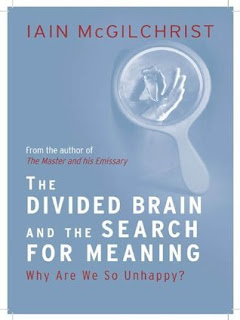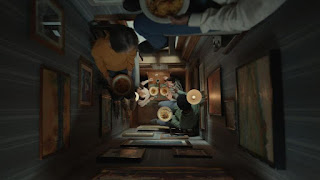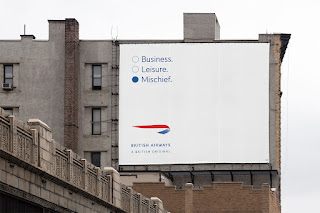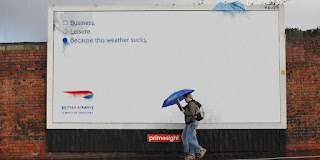Well, this month’s rummage around the Extrawurst files has turned up a cracker. Eighteen years ago, the mood in Germany was at a pretty low ebb. To the rescue came the Du bist Deutschland campaign, masterminded and funded by a consortium of media owners and ad agencies.
While I thought the strategy was smart, I was a touch catty about the creative - and the logo. I didn’t mince my words eighteen years ago. While I’d probably put things a little more diplomatically these days, I stand by what I wrote. This film is so painfully worthy and unfortunately, this style of advertising has spawned a plague which still infects screens today. Even if you’re just advertising bog roll or deodorant.
----------
Since Monday, 3rd October, the public holiday to celebrate German re-unification, a new multi-million advertising campaign has been the talk of the country. Now, Germans don’t usually talk about advertising much except perhaps when the advertising comes from Audi or Mercedes. However, this time, the advertising in question is about a subject very close to everyone’s hearts and tear-ducts here: the country Germany.
That the general morale in Germany is at a pretty low ebb and has been for the last few years should be no surprise to regular readers of Extrawurst. The recent election fiasco and embarrassing performance of the national football team have hardly helped matters but now at least it seems that an effort is being made to get Germany back on its feet again and the very fact that the campaign is being talked about is a good first step.
The campaign itself, “Du bist Deutschland” (“You are Germany”) was initiated by Gunther Thielen, head of media giant Bertelsmann a year ago. Together with ex-colleague Bernd Bauer, the two kick-started a sort of Band-aid action by getting all the heads of the blue-chip media owners and a few advertising agencies together to discuss Germany’s plight and a possible way out, by doing what they knew best. The result is a €34m campaign, involving 25 media companies who have given space and airtime with a concept developed by two of Germany’s leading advertising agencies. This is the biggest public information campaign that has ever run in Germany and will run from October through to January next year. The campaign itself can be seen on the website www.du-bist-deutschland.de .
It is certainly true that Germany needs something to give it a kick up the Arsch if you’ll excuse my Deutsch. A survey from an insurance company (who I’m sure relish these sorts of results) this month found that 52% of Germans are “very afraid of the future”. A comparable figure for 1991 was 25%. With unemployment over 10%, no clear line from the government (or indeed, no clear picture of who or what the government is), German companies re-locating and producing overseas and a talent-drain, it is no surprise that “German Angst” is well-known the world over.
The objectives of the campaign are fine enough. The idea is to prompt a new mood of “can-do” and trust in every single person’s own strength and capabilities throughout Germany. The concept behind the campaign is all about small actions having big effects and is expressed in a “Manifesto” which appears on the website and is the text for the TV campaign. The idea is to lead with a “big bang” in national TV and print and for this to have a catalytic effect then for local activity and action: that each individual at the grass roots level should pick the thing up and run with it. Strategically, the concept seems OK to me although I would question the media strategy, especially as self-reliance and “picking something up and running with it” isn’t very German - they are not terribly good at rugby!
So far, so good. The Media-Aid guys have identified a problem and found a way to solve it. Good for them, even if the problem was blindingly obvious and the solution was borrowed from someone else twenty years ago-but this is not the place to split Herrs. But now we should really take a look at the creative work itself: you can see it for yourself on the website and you don’t really need to understand German or know who all the people are to get the idea. I will start with the so-called “Manifesto” which is the core of the campaign and the text of the 2-minute TV spot and attempt a translation. The manifesto starts with that well-worn cliché of catastrophe theory – that all-powerful butterfly, which I am not sure is too appropriate given the recent spate of horrific worldwide natural disasters:
“You are the miracle of Germany.
A butterfly can unleash a typhoon. The air moved by the flap of its wings can uproot trees a few kilometers away. Just as a breath can become a storm, your deeds can have an effect.
If you think that’s unrealistic then why do you cheer on your team in the stadium if your voice is so unimportant…You are Germany. Your will is like fire in the loins. It lets your favourite striker run more quickly and Schumi drive faster…”
I am sure you get the idea. This priceless prose goes on and on with more mixed metaphors about people being hands which are going to get dirty and being trees, which other hands (I assume dirty German ones) are going to pull out from the roots. There are more references to speed and no speed limits on the German motorways and the inevitable reference to the Wall and tearing it down.
This prose is spoken, sentence by sentence in the 2-minute TV spot by a mixture of well-known and less well-known German faces against a variety of backdrops showing the diversity of the country and its people. All the usual suspects are here if you’re tuned in to German popular culture although those that live in other countries for tax reasons are conspicuous by their absence. Interspersed with the famous faces are a few “heroes of everyday life” - the proud lady toilet attendant, the matey shipbuilders and the stressed but optimistic Mum of many in a high-rise flat. The background music is pinched from the mawkish Hollywood blockbuster Forrest Gump.
The whole thing is, being kind, rather like one of those 1980s corporate ads to fend off takeovers that went on about “there is a company that…” in a droning posh voice where the shareholders dearly wished that they could have the millions that the production and the posh-voiced actor cost in their pockets as dividends instead. Or one of those awful charity record videos where each superstar tries to outdo the last in caterwauling in a really concerned and earnest way. Unfortunately, to my rather cynical English eyes, the spot looks and sounds rather like the opening credits to Little Britain. This is the major problem with the whole thing. The first step on the road to recovery when you’re down in the dumps is to be able to laugh at yourself, even in Germany. Unfortunately, the whole campaign is so toe-curlingly ernsthaft that I’m afraid that the viewer reaction is going to be to reach for the sick bag rather than the desired goose pimples.
One of the most toe-curling scenes, in my opinion, is one where an actor with Down’s syndrome, a gay folk singer and a coloured pop star get together in the holocaust monument. You sort of know what they are trying to say but unfortunately this ultra-political correctness raises all the wrong signals. The print campaign to go with this is even less well-executed, in my view. At least the TV takes present-day personalities, but the print harks back to specially selected heroes from the past: Dürer, Goethe, Einstein and -you’ve guessed it -Beethoven.
Of course, no major campaign of this type should go logo-less and there is a nasty little logo with a sort of Mr Blobby effect character in the colours of the German flag, who is either doing hurdles in clown’s trousers or a goosestep and Hitler salute, depending on how you look at it.
I don’t really like to be so cynical, and I really did want to like this campaign but unfortunately the execution lets it all down. Even the media approach of big bang then trickle-down feels wrong. My instinct tells me that this would have worked so much better if it could have been built up, partly via clever word-of-mouth from a grass-roots level with activities and events on a local level which could then be celebrated in a big national whistles-and-bells spectacular. I also have the feeling in all this that actions speak louder than words. Too many celebrities pointing the finger, however gently, to tell me that I’m master of my own fate is just likely to upset the Germans further, rather than inspire them, as it might the Brits or the Americans. At an even more sinister level, although the campaign is apolitical, some critics have seen it as the government (whoever that is) finding the perfect way to shift the blame for the state the country is in back onto the individual. If you’re unemployed you only have yourself to blame and it’s up to you to get out of the hole you’ve dug.
Maybe I’m wrong, but I can’t really see this campaign doing the trick. What might get Germany back on its feet again is winning the World Cup on home ground next year. But, fortunately for the rest of us, that is one thing that the media barons won’t be able to manipulate or buy, one hopes.
----------
Well, I was almost right in my prediction. Germany didn’t win the World Cup in 2006 but they played a blinder when it came to hosting. Known as the Sommermärchen here, it was a summer of a brilliantly-organised football-love-peace-and-harmony-fest. And then we had Angie, and for a few years everything seemed to be going swimmingly.
But history always goes in cycles and what with Covid, war, recession and Germany not really getting its act together on the digital stuff, we’re now the Sick Man of Europe (or the World?) again. And the national football team is rubbish.
44% of Germans would rather live in the past, compared to 18% who’d rather live in the future. And nearly 60% of the 18 - 29s say they’d prefer the past (maybe 2006?).
But, but, but ... there’s always that thing about history repeating itself.
Germany is hosting Euro 2024 next year. Can it work again?
































